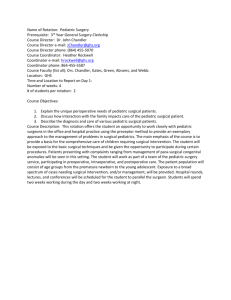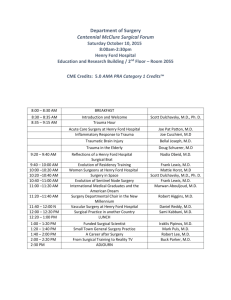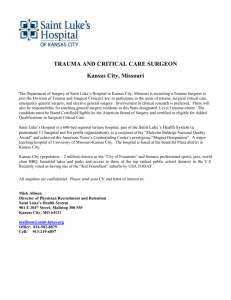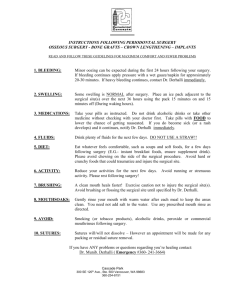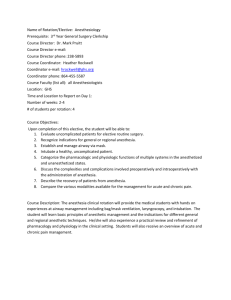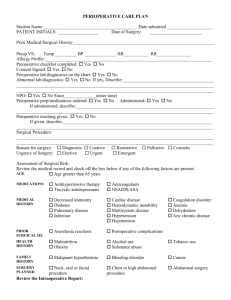Acute-Care-and-Trauma-Surgery-AI
advertisement
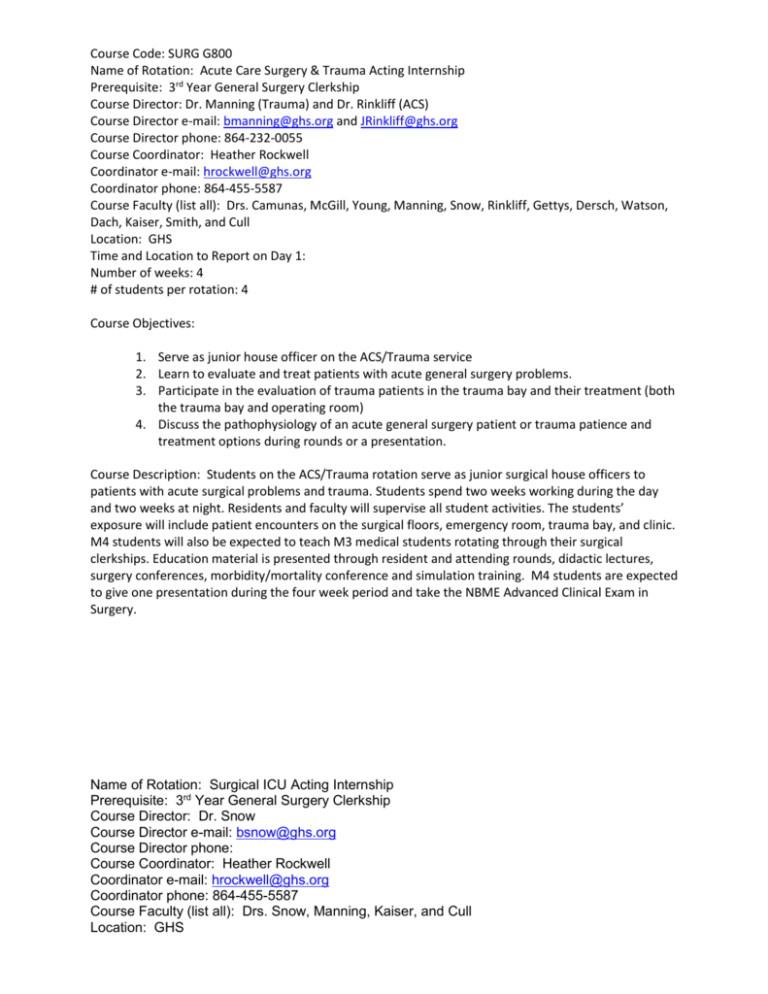
Course Code: SURG G800 Name of Rotation: Acute Care Surgery & Trauma Acting Internship Prerequisite: 3rd Year General Surgery Clerkship Course Director: Dr. Manning (Trauma) and Dr. Rinkliff (ACS) Course Director e-mail: bmanning@ghs.org and JRinkliff@ghs.org Course Director phone: 864-232-0055 Course Coordinator: Heather Rockwell Coordinator e-mail: hrockwell@ghs.org Coordinator phone: 864-455-5587 Course Faculty (list all): Drs. Camunas, McGill, Young, Manning, Snow, Rinkliff, Gettys, Dersch, Watson, Dach, Kaiser, Smith, and Cull Location: GHS Time and Location to Report on Day 1: Number of weeks: 4 # of students per rotation: 4 Course Objectives: 1. Serve as junior house officer on the ACS/Trauma service 2. Learn to evaluate and treat patients with acute general surgery problems. 3. Participate in the evaluation of trauma patients in the trauma bay and their treatment (both the trauma bay and operating room) 4. Discuss the pathophysiology of an acute general surgery patient or trauma patience and treatment options during rounds or a presentation. Course Description: Students on the ACS/Trauma rotation serve as junior surgical house officers to patients with acute surgical problems and trauma. Students spend two weeks working during the day and two weeks at night. Residents and faculty will supervise all student activities. The students’ exposure will include patient encounters on the surgical floors, emergency room, trauma bay, and clinic. M4 students will also be expected to teach M3 medical students rotating through their surgical clerkships. Education material is presented through resident and attending rounds, didactic lectures, surgery conferences, morbidity/mortality conference and simulation training. M4 students are expected to give one presentation during the four week period and take the NBME Advanced Clinical Exam in Surgery. Name of Rotation: Surgical ICU Acting Internship Prerequisite: 3rd Year General Surgery Clerkship Course Director: Dr. Snow Course Director e-mail: bsnow@ghs.org Course Director phone: Course Coordinator: Heather Rockwell Coordinator e-mail: hrockwell@ghs.org Coordinator phone: 864-455-5587 Course Faculty (list all): Drs. Snow, Manning, Kaiser, and Cull Location: GHS Time and Location to Report on Day 1: Number of weeks: 4 # of students per rotation: 4 (2 day/ 2 night float) Course Objectives: 1. 2. 3. 4. Review the clinical concepts used in surgical critical care. Discuss treatment plans for surgical critical care patients. Participate in procedures used in the surgical intensive care unit. Present assigned topics during critical care rounds. Course Description: The surgical critical care rotation will provide M4 students with experience in the clinical concepts and procedures used in surgical critical care. Under the supervision of faculty and residents students provide comprehensive ICU care for complex trauma, vascular, neurosurgical and general surgery patients. Students will also participate in trauma resuscitations in the trauma bay. Students are expected to be an integral part of the ICU team and assist in daily rounds, evaluating new consults, coordinating care with the pulmonary team and performing procedures. Students are expected to present two brief oral reports on assigned topics for critical care teaching rounds. Students will spend two weeks working during the day and two weeks working at night. Name of Rotation: Pediatric Surgery Prerequisite: 3rd Year General Surgery Clerkship Course Director: Dr. John Chandler Course Director e-mail: JChandler@ghs.org Course Director phone: (864) 455-5070 Course Coordinator: Heather Rockwell Coordinator e-mail: hrockwell@ghs.org Coordinator phone: 864-455-5587 Course Faculty (list all): Drs. Chandler, Gates, Green, Abrams, and Webb. Location: GHS Time and Location to Report on Day 1: Number of weeks: 4 # of students per rotation: 4 Course Objectives: 1. Explain the unique perioperative needs of pediatric surgical patients. 2. Discuss how interaction with the family impacts care of the pediatric surgical patient. 3. Describe the diagnosis and care of various pediatric surgical patients. Course Description: This rotation offers the student an opportunity to work closely with pediatric surgeons in the office and hospital practice using the preceptor method to provide an exemplary approach to the management of problems in surgical pediatrics. The main emphasis of the course is to provide a basis for the comprehensive care of children requiring surgical intervention. The student will be exposed to the basic surgical techniques and be given the opportunity to participate during certain procedures. Patients presenting with complaints ranging from management of para-surgical congenital anomalies will be seen in this setting. The student will work as part of a team of the pediatric surgery service, participating in preoperative, intraoperative, and postoperative care. The patient population will consist of age groups from the premature newborn to the young adolescent. Exposure to a broad spectrum of cases needing surgical intervention, and/or management, will be provided. Hospital rounds, lectures, and conferences will be scheduled for the student to parallel the surgeon. Students will spend two weeks working during the day and two weeks working at night. Name of Rotation/Elective: Anesthesiology Prerequisite: 3rd Year General Surgery Clerkship Course Director: Dr. Mark Pruitt Course Director e-mail: Course Director phone: 238-5893 Course Coordinator: Heather Rockwell Coordinator e-mail: hrockwell@ghs.org Coordinator phone: 864-455-5587 Course Faculty (list all): all Anesthesiologists Location: GHS Time and Location to Report on Day 1: Number of weeks: 2-4 # of students per rotation: 4 Course Objectives: Upon completion of this elective, the student will be able to: 1. 2. 3. 4. 5. Evaluate uncomplicated patients for elective routine surgery. Recognize indications for general or regional anesthesia. Establish and manage airway via mask. Intubate a healthy, uncomplicated patient. Categorize the pharmacologic and physiologic functions of multiple systems in the anesthetized and unanesthetized states. 6. Discuss the complexities and complications involved preoperatively and intraoperatively with the administration of anesthesia. 7. Describe the recovery of patients from anesthesia. 8. Compare the various modalities available for the management for acute and chronic pain. Course Description: The anesthesia clinical rotation will provide the medical students with hands on experiences at airway management including bag/mask ventilation, laryngoscopy, and intubation. The student will learn basic principles of anesthetic management and the indications for different general and regional anesthetic techniques. He/she will also experience a practical review and refinement of pharmacology and physiology in the clinical setting. Students will also receive an overview of acute and chronic pain management.
